高考英语基础写作-太空是否值得探索课件
- 格式:ppt
- 大小:521.50 KB
- 文档页数:10
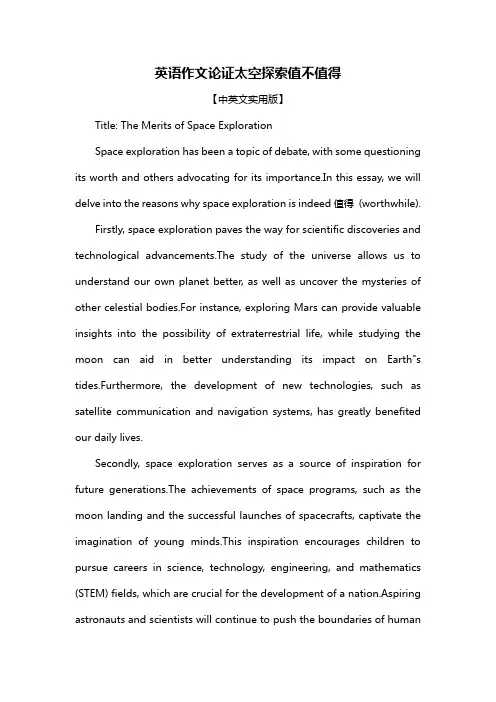
英语作文论证太空探索值不值得【中英文实用版】Title: The Merits of Space ExplorationSpace exploration has been a topic of debate, with some questioning its worth and others advocating for its importance.In this essay, we will delve into the reasons why space exploration is indeed值得(worthwhile).Firstly, space exploration paves the way for scientific discoveries and technological advancements.The study of the universe allows us to understand our own planet better, as well as uncover the mysteries of other celestial bodies.For instance, exploring Mars can provide valuable insights into the possibility of extraterrestrial life, while studying the moon can aid in better understanding its impact on Earth"s tides.Furthermore, the development of new technologies, such as satellite communication and navigation systems, has greatly benefited our daily lives.Secondly, space exploration serves as a source of inspiration for future generations.The achievements of space programs, such as the moon landing and the successful launches of spacecrafts, captivate the imagination of young minds.This inspiration encourages children to pursue careers in science, technology, engineering, and mathematics (STEM) fields, which are crucial for the development of a nation.Aspiring astronauts and scientists will continue to push the boundaries of humanknowledge and exploration, ensuring our society"s progress.Moreover, space exploration contributes to the growth of the economy.The space industry creates job opportunities and stimulates economic activity, both directly and indirectly.Research and development in space technology lead to the creation of innovative products and services, which can have spin-off effects in other sectors of the economy.Additionally, space exploration attracts investment and fosters international cooperation, further promoting economic growth.Lastly, space exploration has the potential to address critical challenges faced by humanity.As our population grows and resources on Earth become increasingly scarce, space offers alternative solutions.The establishment of space colonies or the extraction of resources from other planets can provide a sustainable future for humanity.Furthermore, the study of space weather and cosmic rays can help us better prepare for and mitigate potential threats to our planet, such as solar flares and asteroid impacts.In conclusion, the merits of space exploration far outweigh the costs.It drives scientific and technological advancements, inspires future generations, boosts the economy, and offers potential solutions to critical challenges faced by humanity.Therefore, investing in space exploration is undoubtedly worth it.。
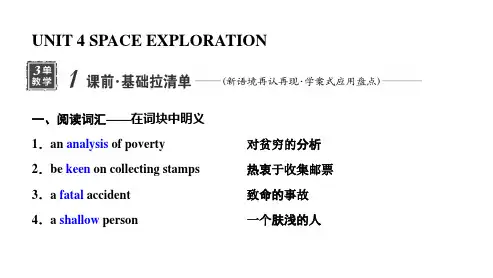
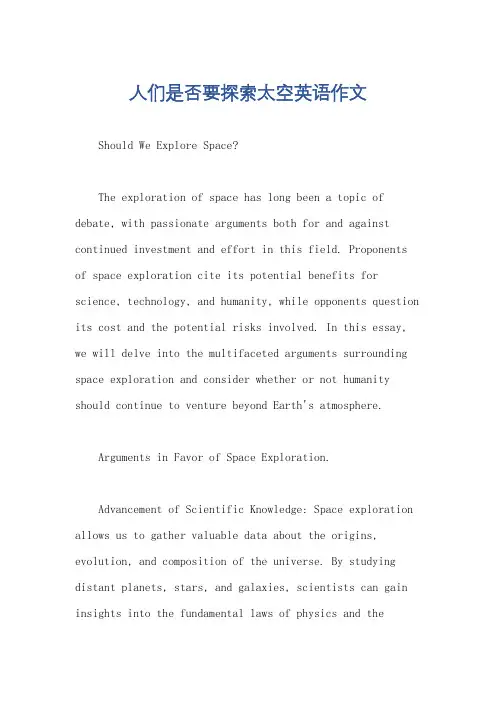
人们是否要探索太空英语作文Should We Explore Space?The exploration of space has long been a topic of debate, with passionate arguments both for and against continued investment and effort in this field. Proponents of space exploration cite its potential benefits for science, technology, and humanity, while opponents question its cost and the potential risks involved. In this essay, we will delve into the multifaceted arguments surrounding space exploration and consider whether or not humanity should continue to venture beyond Earth's atmosphere.Arguments in Favor of Space Exploration.Advancement of Scientific Knowledge: Space exploration allows us to gather valuable data about the origins, evolution, and composition of the universe. By studying distant planets, stars, and galaxies, scientists can gain insights into the fundamental laws of physics and thehistory of our cosmos. Missions like the Hubble Space Telescope and space probes sent to Jupiter and Mars have revolutionized our understanding of the solar system andits place in the vast expanse of space.Technological Innovation: The pursuit of space exploration drives the development of cutting-edge technologies. The design and construction of spacecraft, rockets, and scientific instruments require scientists and engineers to push the boundaries of human ingenuity. This technological advancement has numerous spin-offapplications that benefit society in areas such as medicine, communication, and transportation. GPS systems, weather forecasting, and lightweight materials are just a few examples of technologies that have emerged from space exploration efforts.Inspiration and Education: Space exploration ignites a sense of wonder and curiosity in people of all ages. Images of Earth from space, astronauts floating in zero gravity, and discoveries of distant worlds inspire awe and fuel a desire to learn more about the cosmos. Educational programstied to space exploration can engage students in STEM fields, fostering future generations of scientists and engineers.Economic Benefits: While space exploration can be costly, it also has the potential to generate economic benefits. The development of new technologies andindustries driven by space research can lead to job creation and economic growth. Additionally, space-based services such as satellite communication and Earth observation can provide valuable data for industries like agriculture, transportation, and environmental protection.Arguments Against Space Exploration.Cost: Space exploration is an expensive endeavor. Critics argue that the vast sums of money invested in space programs could be better spent on addressing pressing issues on Earth, such as poverty, disease, and climate change. They question the allocation of resources towards distant ventures when there are urgent needs that remain unmet on our own planet.Risks: Space exploration involves inherent risks to human life and equipment. Spacecraft malfunctions,radiation exposure, and the challenges of long-duration space travel pose significant threats to astronauts.Critics emphasize the importance of minimizing these risks and ensuring the safety of those involved in space missions.Environmental Impact: The launch of rockets and the use of satellites can contribute to air pollution and the generation of space debris. Critics argue that space exploration should be conducted in a sustainable manner, minimizing its environmental impact and ensuring the preservation of the Earth's atmosphere and orbital environment.Distraction from Earthly Concerns: Some critics argue that space exploration diverts attention and resources from addressing pressing global issues on Earth. They believethat humanity should prioritize solving problems such as climate change, inequality, and access to basic necessities before embarking on distant ventures.Conclusion.The decision of whether or not to continue exploring space is complex and involves a careful consideration of the potential benefits and risks. Proponents of space exploration argue that it is essential for scientific advancement, technological innovation, inspiration, and economic growth. Opponents prioritize addressing global issues on Earth, emphasize the cost and risks of space exploration, and question the environmental impact and potential distraction from earthly concerns.Ultimately, the choice of whether to explore space is a matter of human values and priorities. As a society, we must engage in informed discussions, weigh the arguments carefully, and make decisions that balance our desire for knowledge and exploration with our responsibilities towards our planet and our fellow human beings.While space exploration may not be the solution to all our earthly problems, it can play a valuable role inadvancing our scientific understanding, inspiring future generations, and fueling innovation. By embracing a balanced approach that prioritizes both space exploration and the needs of our planet, we can strive to create a future where humanity's ingenuity and curiosity coexist with a deep sense of responsibility for our home on Earth.。
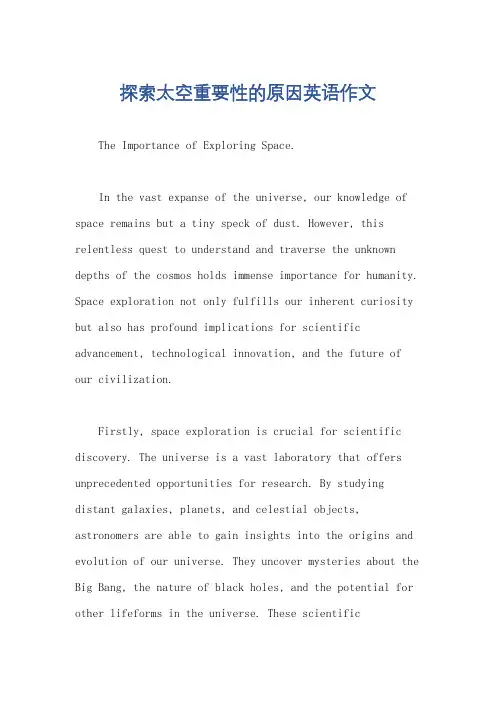
探索太空重要性的原因英语作文The Importance of Exploring Space.In the vast expanse of the universe, our knowledge of space remains but a tiny speck of dust. However, this relentless quest to understand and traverse the unknown depths of the cosmos holds immense importance for humanity. Space exploration not only fulfills our inherent curiosity but also has profound implications for scientific advancement, technological innovation, and the future of our civilization.Firstly, space exploration is crucial for scientific discovery. The universe is a vast laboratory that offers unprecedented opportunities for research. By studying distant galaxies, planets, and celestial objects, astronomers are able to gain insights into the origins and evolution of our universe. They uncover mysteries about the Big Bang, the nature of black holes, and the potential for other lifeforms in the universe. These scientificbreakthroughs not only expand our understanding of the cosmos but also contribute to our knowledge of the fundamental laws of nature.Moreover, space exploration plays a vital role in technological innovation. The challenges faced in space exploration require the development of cutting-edge technologies. These advancements in areas such as robotics, materials science, and propulsion systems have numerous spin-off benefits for society. For instance, satellite technology, originally developed for space missions,。

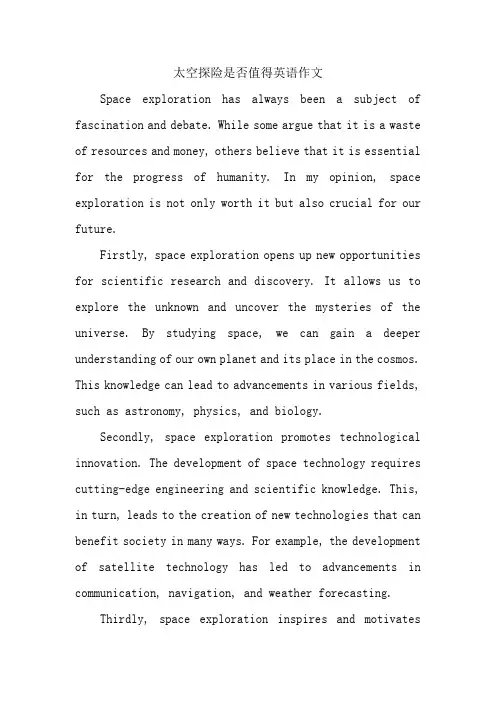
太空探险是否值得英语作文Space exploration has always been a subject of fascination and debate. While some argue that it is a waste of resources and money, others believe that it is essential for the progress of humanity. In my opinion, space exploration is not only worth it but also crucial for our future.Firstly, space exploration opens up new opportunities for scientific research and discovery. It allows us to explore the unknown and uncover the mysteries of the universe. By studying space, we can gain a deeper understanding of our own planet and its place in the cosmos. This knowledge can lead to advancements in various fields, such as astronomy, physics, and biology.Secondly, space exploration promotes technological innovation. The development of space technology requires cutting-edge engineering and scientific knowledge. This, in turn, leads to the creation of new technologies that can benefit society in many ways. For example, the development of satellite technology has led to advancements in communication, navigation, and weather forecasting.Thirdly, space exploration inspires and motivatesfuture generations. It ignites a sense of curiosity and wonder in children and young adults, encouraging them to pursue careers in science, technology, engineering, and mathematics (STEM). By inspiring the next generation of scientists and engineers, space exploration can contribute to the continued progress of humanity.Fourthly, space exploration fosters international cooperation and collaboration. The exploration of space requires the collective efforts of countries around the world. This collaboration can lead to improved relations and understanding between nations, promoting peace and stability.In conclusion, space exploration is not only worth it but also crucial for our future. It opens up new opportunities for scientific research, promotes technological innovation, inspires future generations, and fosters international cooperation. By investing in space exploration, we can contribute to the continued progress of humanity and pave the way for a better future.中文翻译:太空探险一直是令人着迷和争议的话题。
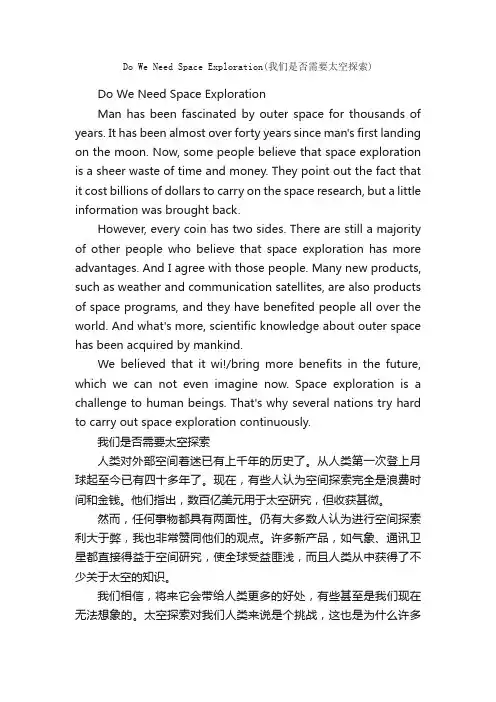
Do We Need Space Exploration(我们是否需要太空探索)Do We Need Space ExplorationMan has been fascinated by outer space for thousands of years. It has been almost over forty years since man's first landing on the moon. Now, some people believe that space exploration is a sheer waste of time and money. They point out the fact that it cost billions of dollars to carry on the space research, but a little information was brought back.However, every coin has two sides. There are still a majority of other people who believe that space exploration has more advantages. And I agree with those people. Many new products, such as weather and communication satellites, are also products of space programs, and they have benefited people all over the world. And what's more, scientific knowledge about outer space has been acquired by mankind.We believed that it wi!/bring more benefits in the future, which we can not even imagine now. Space exploration is a challenge to human beings. That's why several nations try hard to carry out space exploration continuously.我们是否需要太空探索人类对外部空间着迷已有上千年的历史了。

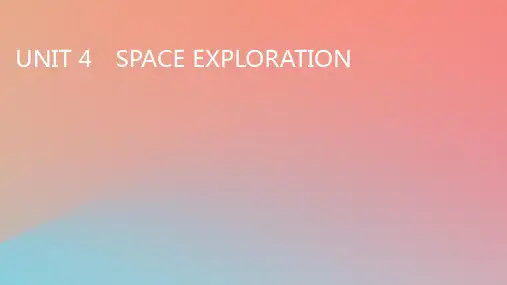
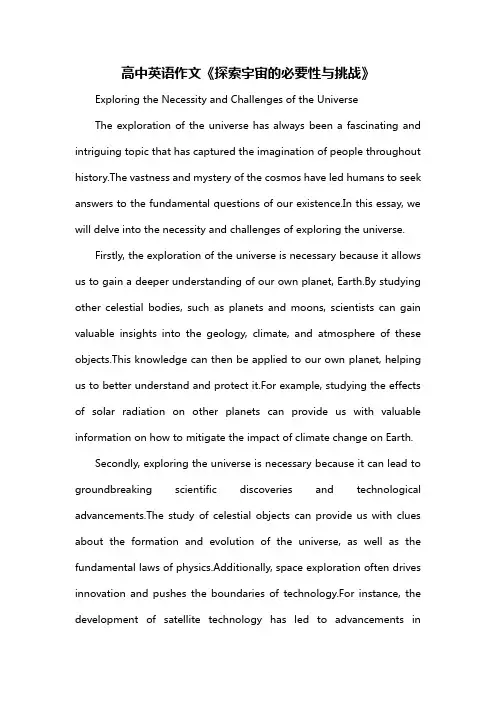
高中英语作文《探索宇宙的必要性与挑战》Exploring the Necessity and Challenges of the UniverseThe exploration of the universe has always been a fascinating and intriguing topic that has captured the imagination of people throughout history.The vastness and mystery of the cosmos have led humans to seek answers to the fundamental questions of our existence.In this essay, we will delve into the necessity and challenges of exploring the universe.Firstly, the exploration of the universe is necessary because it allows us to gain a deeper understanding of our own planet, Earth.By studying other celestial bodies, such as planets and moons, scientists can gain valuable insights into the geology, climate, and atmosphere of these objects.This knowledge can then be applied to our own planet, helping us to better understand and protect it.For example, studying the effects of solar radiation on other planets can provide us with valuable information on how to mitigate the impact of climate change on Earth.Secondly, exploring the universe is necessary because it can lead to groundbreaking scientific discoveries and technological advancements.The study of celestial objects can provide us with clues about the formation and evolution of the universe, as well as the fundamental laws of physics.Additionally, space exploration often drives innovation and pushes the boundaries of technology.For instance, the development of satellite technology has led to advancements incommunication, navigation, and weather forecasting.However, exploring the universe also presents numerous challenges.One of the biggest challenges is the vastness of space.The distances between planets and stars are immense, making travel time and communication difficult.This necessitates the development of advanced propulsion systems and communication technologies.Another challenge is the harsh environment of space.宇宙is a harsh and unforgiving environment, with extreme temperatures, radiation, and vacuum.This poses a significant risk to both human astronauts and robotic spacecraft.To overcome these challenges, scientists and engineers must develop protective suits, spacecraft, and life support systems that can withstand the harsh conditions of space.Furthermore, the exploration of the universe requires a significant amount of resources, both financial and human.Space missions can be expensive, requiring funding from governments and private entities.Additionally, the training and recruitment of astronauts and scientists with the necessary expertise is a time-consuming and costly process.In conclusion, exploring the universe is necessary for gaining a deeper understanding of our own planet and making scientific discoveries that can benefit humanity.However, it also presents significant challenges that must be overcome through innovation, technologicaladvancements, and resource allocation.As we continue to explore the cosmos, we must remain committed to pushing the boundaries of human knowledge and strive to overcome the challenges that lie ahead.。
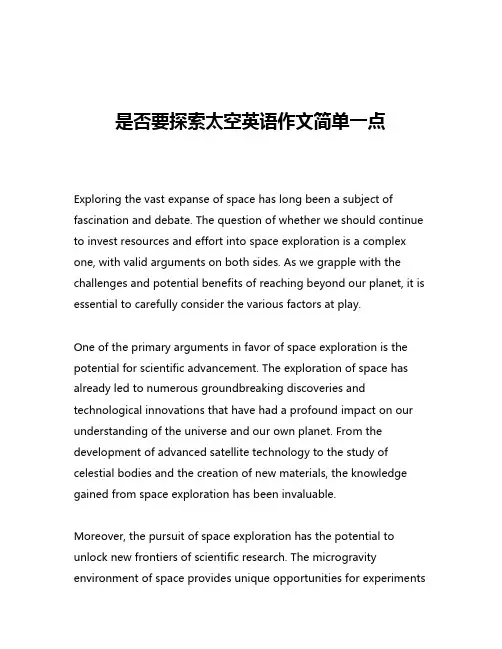
是否要探索太空英语作文简单一点Exploring the vast expanse of space has long been a subject of fascination and debate. The question of whether we should continue to invest resources and effort into space exploration is a complex one, with valid arguments on both sides. As we grapple with the challenges and potential benefits of reaching beyond our planet, it is essential to carefully consider the various factors at play.One of the primary arguments in favor of space exploration is the potential for scientific advancement. The exploration of space has already led to numerous groundbreaking discoveries and technological innovations that have had a profound impact on our understanding of the universe and our own planet. From the development of advanced satellite technology to the study of celestial bodies and the creation of new materials, the knowledge gained from space exploration has been invaluable.Moreover, the pursuit of space exploration has the potential to unlock new frontiers of scientific research. The microgravity environment of space provides unique opportunities for experimentsand observations that are simply not possible on Earth. This could lead to breakthroughs in fields such as medicine, materials science, and even the development of new energy sources. By continuing to explore space, we may uncover solutions to some of the most pressing challenges facing humanity, from climate change to the search for extraterrestrial life.Another compelling argument for space exploration is the potential for economic and technological benefits. The space industry has already created numerous high-skilled jobs and has sparked the development of innovative technologies that have found applications in various sectors, from communications to transportation. Continued investment in space exploration could further drive technological progress and create new industries, leading to economic growth and the creation of new job opportunities.Furthermore, the exploration of space has the potential to inspire and captivate people around the world, particularly younger generations. The awe-inspiring images and discoveries from space missions can ignite the curiosity and imagination of people, inspiring them to pursue careers in science, technology, engineering, and mathematics (STEM) fields. This can have a ripple effect on the development of a highly skilled workforce, which is essential for addressing the complex challenges of the future.However, there are also valid concerns and arguments against the continued investment in space exploration. One of the primary criticisms is the high cost associated with such endeavors. Space missions often require significant financial resources, which could be redirected towards more pressing social and environmental issues, such as poverty alleviation, healthcare, and addressing climate change. Proponents of this view argue that the resources dedicated to space exploration could have a more immediate and tangible impact on the lives of people on Earth.Another concern is the potential environmental impact of space exploration. The launch of rockets and the operation of spacecraft can contribute to greenhouse gas emissions and pollution, which could exacerbate the already pressing issue of climate change. While the space industry has made strides in developing more environmentally-friendly technologies, the long-term impact of sustained space exploration on the environment remains a valid concern.Additionally, some critics argue that the potential benefits of space exploration are uncertain and may not justify the significant investment required. They contend that the resources and efforts dedicated to space exploration could be better utilized in addressing more immediate and pressing challenges facing humanity, such asimproving education, healthcare, and infrastructure.Ultimately, the decision to continue investing in space exploration is a complex one that requires a careful weighing of the potential benefits and drawbacks. While the arguments on both sides have merit, it is crucial to consider the long-term implications and the broader context in which these decisions are made.One potential solution is to strike a balance between the pursuit of space exploration and the allocation of resources towards more immediate societal needs. This could involve a more strategic and targeted approach to space exploration, focusing on projects and missions that have the greatest potential for scientific and technological advancement, while also ensuring that the resources dedicated to such endeavors do not come at the expense of addressing pressing issues on Earth.Moreover, it is essential to continue to explore ways to make space exploration more sustainable and environmentally-friendly, through the development of cleaner technologies and the implementation of measures to mitigate the environmental impact of space activities.In conclusion, the question of whether we should continue to explore space is a complex and multifaceted issue. While there are valid arguments on both sides, the potential benefits of space exploration,particularly in the realms of scientific advancement, technological innovation, and inspiring future generations, make a compelling case for continued investment and exploration. However, it is crucial to carefully weigh these potential benefits against the concerns and challenges, and to strive for a balanced and sustainable approach that can maximize the positive impact of space exploration while also addressing the pressing needs of our planet and its inhabitants.。
人们是否应该探索外太空英语作文Exploring the Vast Expanse of Outer SpaceThe vast expanse of outer space has captivated the human imagination for centuries. From ancient stargazers to modern-day astronauts, the allure of the unknown has driven us to unravel the mysteries of the cosmos. As we grapple with the question of whether we should continue to explore the depths of outer space, it is crucial to consider the potential benefits and challenges that such endeavors present.One of the primary arguments in favor of space exploration is the potential for scientific advancement. By studying the planets, stars, and other celestial bodies, we can gain a deeper understanding of the formation and evolution of our universe. This knowledge can lead to breakthroughs in fields such as astrophysics, cosmology, and planetary science, potentially unlocking new avenues for technological innovation and human understanding.Moreover, the exploration of outer space has the potential to yield invaluable resources. Asteroids and other celestial bodies may contain rare minerals and elements that are scarce on Earth, whichcould be harnessed to meet the growing demands of our global society. Additionally, the colonization of other planets, such as Mars, could provide new habitats for human settlement, alleviating the strain on our planet's resources and paving the way for a more sustainable future.Furthermore, the pursuit of space exploration has the power to unite humanity in a common goal, fostering international cooperation and scientific collaboration. By working together to push the boundaries of our knowledge and capabilities, we can transcend political and cultural divides, and inspire future generations to continue the quest for understanding the cosmos.However, the exploration of outer space is not without its challenges and drawbacks. The financial cost of space programs can be staggering, often diverting resources from pressing issues on Earth, such as poverty, healthcare, and environmental protection. Additionally, the risks associated with space travel, including the potential for accidents and the long-term effects of microgravity on the human body, must be carefully considered and mitigated.Another concern is the potential impact of space exploration on the environment. The launch of rockets and the establishment of extraterrestrial settlements could contribute to pollution and the depletion of natural resources, potentially exacerbating theenvironmental challenges we already face on Earth.Despite these challenges, the potential benefits of space exploration cannot be ignored. The exploration of outer space has the power to inspire and captivate people around the world, fostering a sense of wonder and curiosity that can drive innovation and scientific progress. Furthermore, the knowledge and resources gained from space exploration could be leveraged to address some of the most pressing issues facing our planet, such as the development of sustainable energy sources and the mitigation of climate change.Ultimately, the decision to continue exploring outer space is a complex one that requires careful consideration of the potential risks and rewards. While there are valid concerns about the financial and environmental costs, the potential scientific and societal benefits may outweigh these drawbacks. As we grapple with this decision, it is crucial that we engage in open and informed discussions, drawing upon the expertise of scientists, policymakers, and the public to chart the best course forward.。
Do We Need Space Exploration(我们是否需要太空探索)Do We Need Space ExplorationMan has been fascinated by outer space for thousands of years. It has been almost over forty years since man's first landing on the moon. Now, some people believe that space exploration is a sheer waste of time and money. They point out the fact that it cost billions of dollars to carry on the space research, but a little information was brought back.However, every coin has two sides. There are still a majority of other people who believe that space exploration has more advantages. And I agree with those people. Many new products, such as weather and communication satellites, are also products of space programs, and they have benefited people all over the world. And what's more, scientific knowledge about outer space has been acquired by mankind.We believed that it wi!/bring more benefits in the future, which we can not even imagine now. Space exploration is a challenge to human beings. That's why several nations try hard to carry out space exploration continuously.我们是否需要太空探索人类对外部空间着迷已有上千年的历史了。